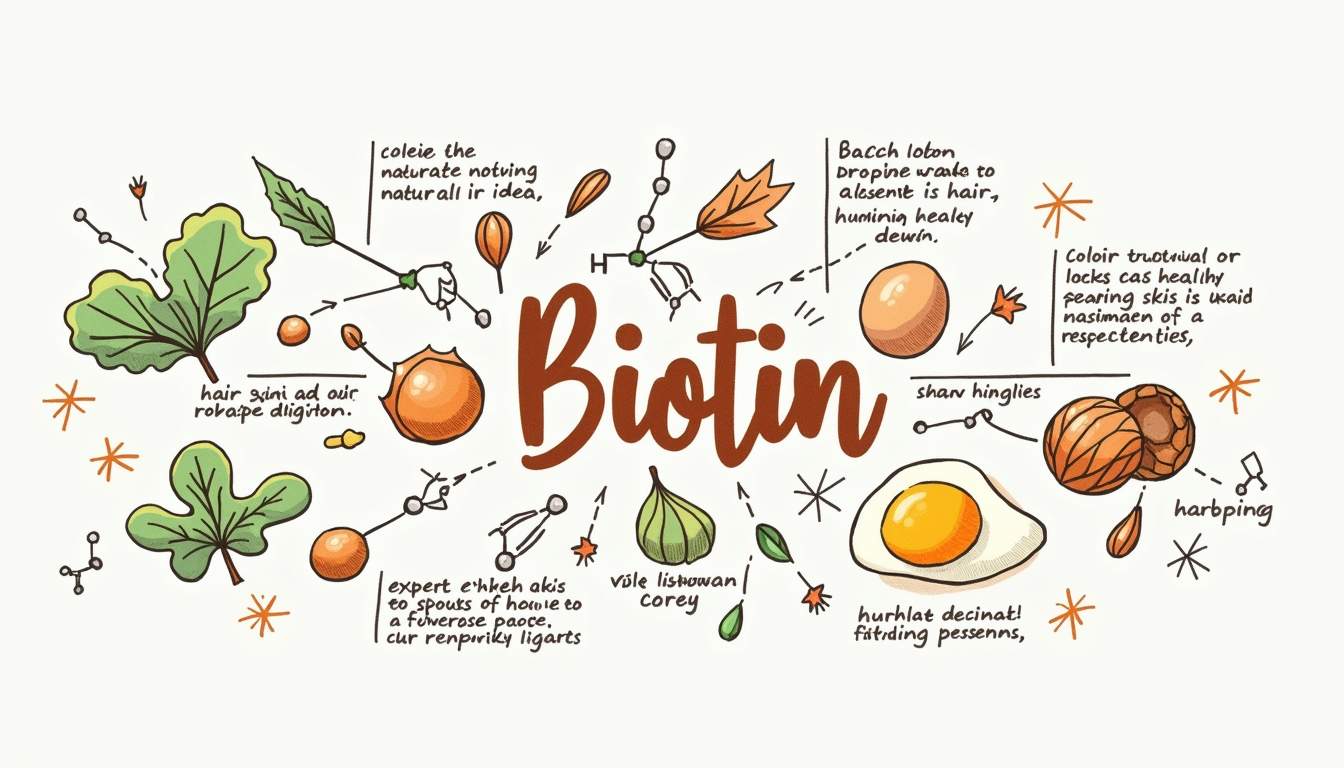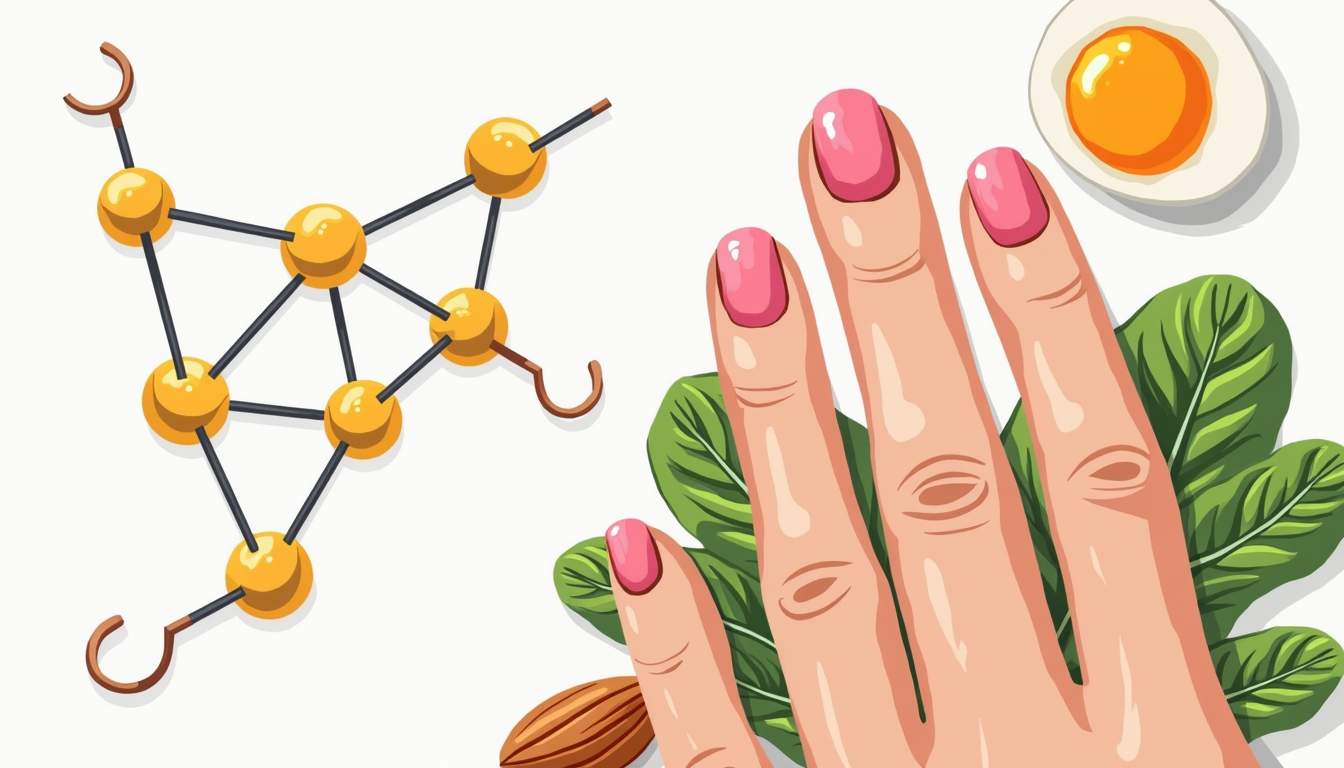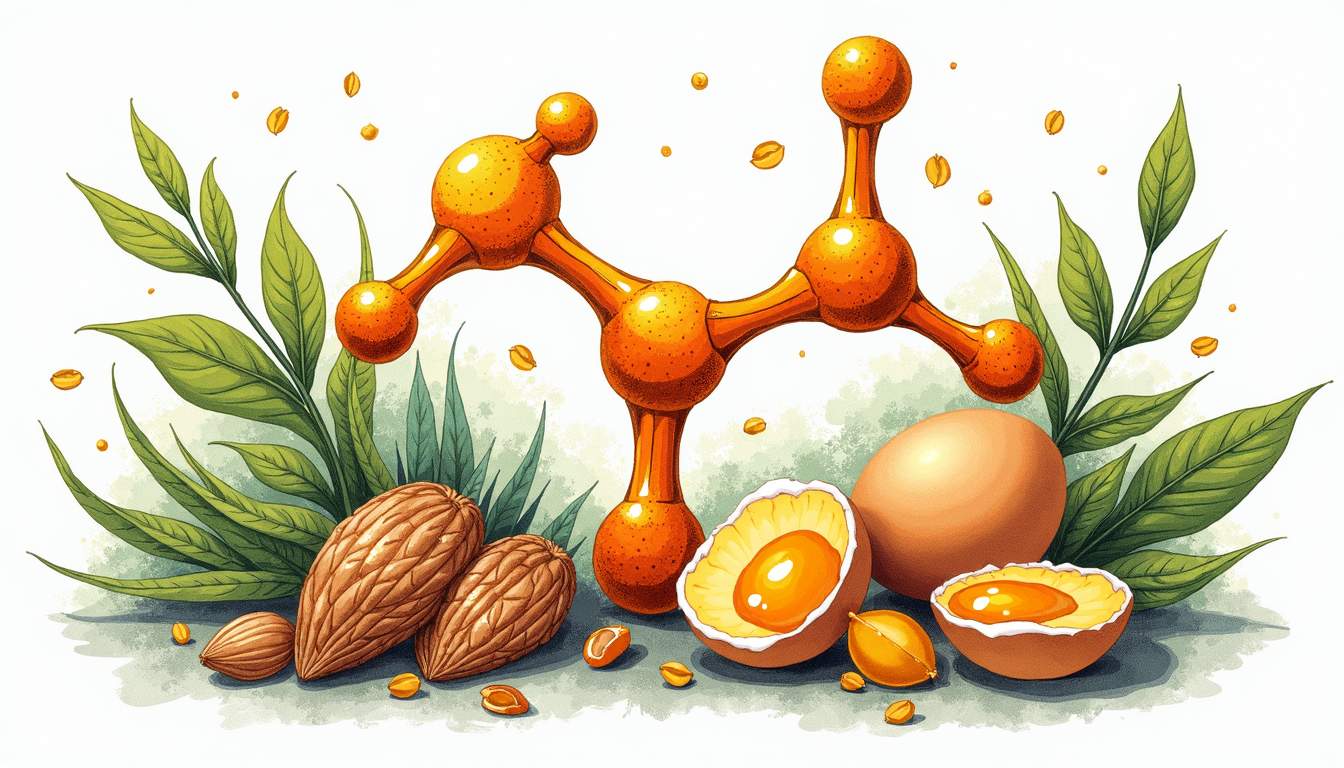Biotin, also known as vitamin B7, is a water-soluble vitamin that plays a crucial role in the health of hair, skin, and nails. It is part of the B-complex vitamins, which help convert food into energy and support various metabolic functions. Over the years, biotin has gained popularity as a supplement for promoting hair and nail growth, leading many to wonder about its actual benefits, recommended dosages, and the results one can expect. This article explores the science behind biotin, its effects on hair and nails, and how to incorporate it into your routine effectively.
What does biotin do for hair and nails?
Biotin supports the production of keratin, a protein essential for hair and nail strength. Supplementing with biotin can help promote hair growth, improve thickness, reduce breakage, and strengthen brittle nails, especially in those with biotin deficiency.
Understanding Biotin
Biotin is essential for several bodily functions, including the metabolism of carbohydrates, fats, and proteins. It is naturally found in foods such as eggs, nuts, seeds, fish, and certain vegetables. Despite its presence in various foods, many individuals may not consume enough biotin, leading to deficiencies that can affect hair and nail health. Furthermore, biotin plays a crucial role in the conversion of nutrients into energy, making it a key player in maintaining overall vitality and metabolic efficiency.

The Role of Biotin in the Body
Biotin is vital for maintaining healthy skin, hair, and nails. It aids in the production of keratin, a protein that forms the structure of hair and nails. Additionally, biotin contributes to the overall health of the scalp, promoting a conducive environment for hair growth. Its deficiency can lead to brittle hair and nails, hair loss, and skin issues, underscoring the importance of adequate biotin intake. Beyond its beauty benefits, biotin also supports the nervous system and plays a role in the synthesis of fatty acids, which are essential for brain health and cognitive function.
Sources of Biotin
While biotin supplements are widely available, it is beneficial to obtain this vitamin through a balanced diet. Foods rich in biotin include:
- Egg yolks
- Nuts (especially almonds and walnuts)
- Seeds (such as sunflower seeds)
- Fish (like salmon and sardines)
- Sweet potatoes
- Spinach
- Cauliflower
Incorporating these foods into your meals can help ensure sufficient biotin levels, supporting not just hair and nails but overall health. Additionally, cooking methods can impact biotin levels in foods; for instance, while raw egg whites contain avidin, a protein that binds biotin and inhibits its absorption, cooking the eggs can deactivate avidin, allowing for better biotin availability. Exploring a variety of recipes that include biotin-rich ingredients can also enhance your dietary intake, making it easier to enjoy the benefits of this vital nutrient.
Benefits of Biotin for Hair
The relationship between biotin and hair health has been the subject of numerous studies and anecdotal reports. Many individuals take biotin supplements with the hope of enhancing hair growth, thickness, and overall appearance. This vitamin, also known as Vitamin B7, plays a crucial role in the body’s metabolic processes, particularly in the conversion of food into energy, which is essential for maintaining healthy hair and skin.
Promoting Hair Growth
Biotin is often touted for its ability to promote hair growth. Some studies suggest that biotin supplementation can lead to an increase in hair growth in individuals experiencing thinning hair or hair loss. It is believed that biotin enhances the keratin infrastructure in hair follicles, leading to stronger and healthier hair strands. Furthermore, biotin's role in the synthesis of fatty acids may help in the production of sebum, an oily substance that keeps hair moisturized and prevents dryness, which can be detrimental to hair growth.
Improving Hair Thickness and Strength
In addition to promoting growth, biotin may also improve hair thickness and strength. Individuals who incorporate biotin into their routine often report that their hair feels fuller and more resilient. This is particularly beneficial for those with fine or brittle hair, as biotin can help fortify each strand, reducing breakage and promoting a healthier appearance. The vitamin's ability to improve keratin production is not only limited to hair but extends to nails as well, making it a popular choice for those seeking overall beauty enhancements.
Enhancing Scalp Health
Healthy hair starts with a healthy scalp. Biotin contributes to maintaining scalp health by promoting circulation and providing essential nutrients to hair follicles. A well-nourished scalp is less prone to issues such as dryness and irritation, creating a more favorable environment for hair growth. Additionally, biotin's antioxidant properties may help combat oxidative stress, which can lead to premature hair aging and loss. By ensuring that the scalp remains hydrated and free from inflammation, biotin can play a pivotal role in supporting the hair growth cycle.
Supporting Overall Hair Health
Beyond growth, thickness, and scalp health, biotin also supports overall hair health by contributing to the formation of amino acids, which are the building blocks of proteins. Since hair is primarily made of a protein called keratin, adequate biotin levels are essential for maintaining the integrity and strength of hair strands. Moreover, a deficiency in biotin can lead to hair that is dull, lifeless, and prone to damage, underscoring the importance of this vitamin in one's diet or supplement regimen. Many people find that incorporating biotin-rich foods, such as eggs, nuts, and whole grains, alongside supplementation can lead to even more pronounced benefits for their hair.
Benefits of Biotin for Nails
Just as biotin plays a vital role in hair health, it is equally important for maintaining strong and healthy nails. Brittle nails can be a frustrating issue, leading to breakage and slow growth. Many people are unaware that the health of their nails can be a reflection of their overall nutritional status, and biotin is one of the key players in this equation.

Strengthening Nails
Biotin has been shown to strengthen nails and reduce brittleness. Many individuals who experience weak or peeling nails find that biotin supplementation leads to noticeable improvements. This is particularly significant for those who frequently use nail polish or engage in activities that can weaken nails. The vitamin works by enhancing the keratin infrastructure in nails, which is crucial for their resilience. As a result, nails become less prone to chipping and breaking, allowing for a more polished appearance.
Promoting Nail Growth
In addition to strengthening nails, biotin may also promote faster nail growth. Some studies indicate that individuals taking biotin supplements experience an increase in nail growth rate. This can be particularly advantageous for those looking to achieve longer, healthier nails. Biotin aids in the metabolism of amino acids, which are the building blocks of proteins, including keratin. By ensuring that the body has an adequate supply of these nutrients, biotin helps to create a favorable environment for nail growth, making it easier to achieve that desired length.
Reducing Nail Splitting
Nail splitting is a common issue that can be exacerbated by environmental factors, such as exposure to water and chemicals. Biotin helps to improve the overall integrity of nails, making them less susceptible to splitting and damage. Regular biotin intake can lead to smoother, healthier nails that are less prone to breakage. Furthermore, biotin's role in maintaining hydration levels within the nail matrix contributes to its ability to prevent splitting. When nails are well-hydrated, they are more flexible and less likely to suffer from the stress of everyday activities.
Enhancing Nail Appearance
Beyond strength and growth, biotin also plays a role in enhancing the overall appearance of nails. Healthy nails tend to have a natural shine and smooth texture, which can be further accentuated by biotin supplementation. Individuals often report that their nails look more vibrant and polished after incorporating biotin into their routine. This can be particularly beneficial for those who enjoy showcasing their nails through manicures or nail art, as healthier nails provide a better canvas for creativity.
Synergistic Effects with Other Nutrients
Biotin works best when combined with other vitamins and minerals that support nail health. Nutrients such as zinc, vitamin E, and omega-3 fatty acids can enhance the benefits of biotin, creating a synergistic effect that promotes not only stronger and healthier nails but also overall nail vitality. A well-rounded diet that includes these nutrients, along with biotin, can lead to remarkable improvements in nail condition. Incorporating foods rich in these vitamins, such as nuts, seeds, and leafy greens, can further bolster the effects of biotin supplementation, leading to nails that are not only strong but also radiant and resilient.
Recommended Dosage of Biotin
Determining the appropriate dosage of biotin can depend on various factors, including age, gender, and individual health needs. While biotin is generally considered safe, it is essential to adhere to recommended guidelines to avoid potential side effects.
General Guidelines
The recommended daily intake of biotin varies. For adults, a common dosage ranges from 30 to 100 micrograms (mcg) per day. However, some studies have used higher doses, up to 5000 mcg, particularly for individuals with specific deficiencies or concerns regarding hair and nail health. It is advisable to consult a healthcare professional before starting any new supplement regimen. Additionally, pregnant and breastfeeding women may have different requirements, often needing higher amounts to support fetal and infant development, which underscores the importance of personalized advice from a healthcare provider.
Potential Side Effects
Biotin is generally well-tolerated, and side effects are rare. However, some individuals may experience mild gastrointestinal discomfort or skin rashes. High doses of biotin can interfere with certain laboratory tests, leading to inaccurate results. Therefore, it is crucial to inform healthcare providers about biotin supplementation if undergoing medical tests. Furthermore, while adverse effects are uncommon, it's worth noting that excessive supplementation could lead to imbalances in other B vitamins, as they often work synergistically in the body. Monitoring overall nutrient intake can help maintain optimal health.
Timing and Form of Biotin
Biotin supplements come in various forms, including capsules, tablets, and gummies. The timing of consumption may also influence absorption. Taking biotin with meals can enhance its absorption, making it more effective. Consistency is key; incorporating biotin into a daily routine can yield the best results over time. Moreover, the choice of supplement form can also impact user experience; for example, gummies may be more appealing to those who dislike swallowing pills, particularly children or individuals with swallowing difficulties. It’s essential to choose a form that fits your lifestyle and preferences to ensure adherence to the supplementation plan.
Expected Results from Biotin Supplementation
Individuals seeking to improve their hair and nail health through biotin supplementation often wonder what results they can expect and how long it may take to see noticeable changes.
Timeline for Results
While some individuals may notice improvements in hair and nail health within a few weeks, it typically takes several months to see significant results. Hair growth cycles and nail growth rates vary among individuals, so patience is essential. Generally, users report visible changes in hair thickness and nail strength after about three to six months of consistent biotin intake.
Variability in Results
It is important to note that results can vary widely among individuals. Factors such as genetics, overall health, and lifestyle choices can influence the effectiveness of biotin supplementation. While many individuals experience positive outcomes, others may not notice substantial changes. Maintaining a balanced diet and healthy lifestyle can further enhance the benefits of biotin.
Complementing Biotin with Other Nutrients
For optimal results, biotin supplementation can be complemented with other essential nutrients that support hair and nail health. Nutrients such as zinc, iron, and vitamins A, C, and E play a vital role in maintaining healthy hair and nails. A well-rounded approach to nutrition can amplify the effects of biotin, leading to more pronounced results.
In addition to these vitamins and minerals, omega-3 fatty acids are also crucial for promoting scalp health and reducing inflammation, which can contribute to hair loss. Foods rich in omega-3s, such as fatty fish, flaxseeds, and walnuts, can be beneficial when incorporated into a diet alongside biotin. Furthermore, hydration plays an equally important role; drinking adequate amounts of water helps to keep hair and nails moisturized, preventing brittleness and breakage.
Monitoring Progress
As individuals embark on their biotin supplementation journey, it can be helpful to keep a journal to track progress over time. Documenting changes in hair and nail health, along with any other lifestyle modifications, can provide valuable insights into what works best for each person. Photographs taken at regular intervals can also serve as a visual reminder of improvements, motivating individuals to stay committed to their supplementation and dietary regimen. This proactive approach not only fosters accountability but also enhances the overall experience of seeking healthier hair and nails.
Conclusion
Biotin is a powerful vitamin that can significantly enhance hair and nail health. With its ability to promote growth, strengthen, and improve overall appearance, biotin has become a go-to supplement for many individuals seeking to enhance their beauty regimen. While results may vary, incorporating biotin into a balanced diet and lifestyle can lead to noticeable improvements over time.
Before starting any new supplement, it is advisable to consult with a healthcare professional to determine the appropriate dosage and ensure it aligns with individual health needs. With the right approach, biotin can be an effective ally in achieving healthier hair and nails.
Try our premium Biotin supplement: https://thevitaminsco.com/products/biotin

Share:
What Are Biotin Tablets and How Do They Help Hair?
Biotin Vitamins for Perimenopause Hair Loss